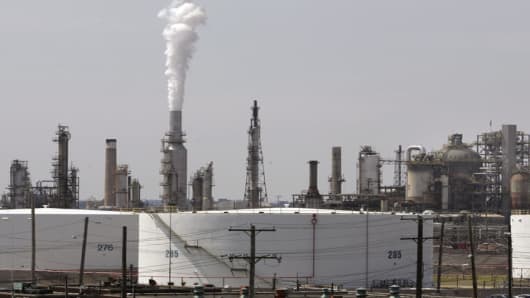Oil prices eased Thursday, after a seesaw session as dealers weighed tight U.S. crude inventories against the threat of an economic slowdown slashing global energy demand growth next year.
U.S. light, sweet crude settled 18 cents lower at $91.06 per barrel after trading between $90.57 and $92.25.
London Brent crude fell 60 cents to $90.88.
"There was choppy trading due to light pre-holiday volume and the ongoing competing views about whether a tight supply picture or threats to economic growth are the most compelling," said Mike Fitzpatrick, vice president at MF Global.
Oil prices soared to a record near $100 a barrel last month on fears of a winter supply crunch, but they have since retreated amid growing signs that a credit crisis is undermining the U.S. economy.
A government report on Wednesday showed U.S. crude stockpiles fell to their lowest level in nearly three years.
But the slide in stockpiles could be reversed in coming weeks as foul weather that had disrupted shipping on the Gulf Coast lifts, experts said.
"For now, price reaction to yesterday's big crude stock draw is being tempered by a perception that supplies will rebound next week," said Jim Ritterbusch, president of Ritterbusch & Associates in Galena, Ill.
U.S. crude stocks have fallen about 16 percent since late June and are about 9 percent below a year ago, pressured in part by OPEC output restraints, according to the U.S. Energy Information Administration.
Dealers said the impact of the thinning inventory levels has been muted by fears that economic turmoil in the United States could hamper growth in demand for fuel.
The U.S. Energy Information Administration, the International Energy Agency and OPEC have all slashed their projections for world energy demand growth in 2008, citing the threat of an economic slowdown.
Briefly supporting oil prices earlier in the day, shipping traffic through the Suez canal, a strategic waterway which links the Middle East and Asia with Europe, was suspended temporarily by an incident between two oil vessels near the southern entrance to the canal.
Meanwhile, China, the world's second-biggest oil consumer, raised benchmark interest rates for the sixth time this year to contain inflation and prevent its economy from overheating.
China's appetite for oil has been a key factor helping to drive oil prices to record peaks near $100 per barrel.


